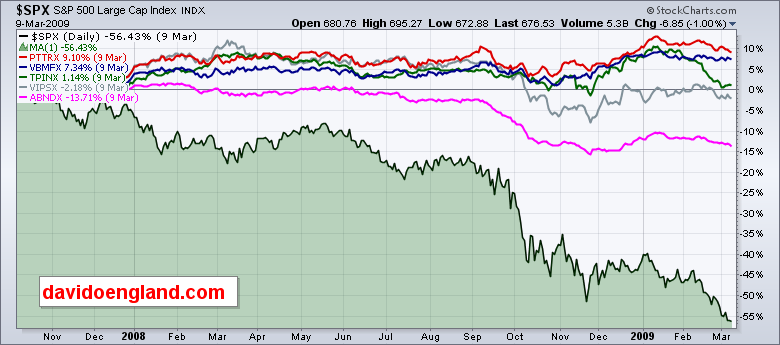In this three-part series, I address your question, “When equities go down, do bonds go up?” This is an excellent question many investors have when determining asset allocation for their portfolios. Last week, I compared the top bond funds performance vs. the market (S&P 500) during the 2000-2003 sell-off.
I designed today’s chart to see if these bond funds went up when equities (stocks) went down during the 2007-2009 sell-off. The top bond funds in terms of size and available data include: 1. PIMCO Total Return Fund (PTTRX); 2. Vanguard Total Bond Market Index Fund (VBMFX); 3. Templeton Global Bond Fund (TPINX); 4. Vanguard Inflation-Protected-Securities (VIPSX); 5. American Funds Bond Fund of America (ABNDX). Some funds are front loaded with large commissions and hefty expenses, while others have zero commissions and very low expense ratios. Although some funds require a hefty minimum initial investment, all can be purchased through many online brokerages with a low minimum investment.
In today’s chart, you can see the performance of these bond funds in terms of the market (S&P 500) during the 2007-2009 sell-off. During this time frame, the equity market dropped over 56 percent. Only three of the five bond funds went up but only minimally. The top performer, PTTRX, only went up 9.10%. In addition, VIPSX and ABNDX had negative returns.

This data helps to answer your question: “When equities go down, do bonds go up?” Keep in mind that past performance does not dictate future returns.
Plan your work, work your plan, and share your harvest!
Source: http://learnbonds.com/10-largest-bond-mutual-funds/, davidoengland.com, stockcharts.com
Full Disclosure-I do not own any securities listed in this column.
